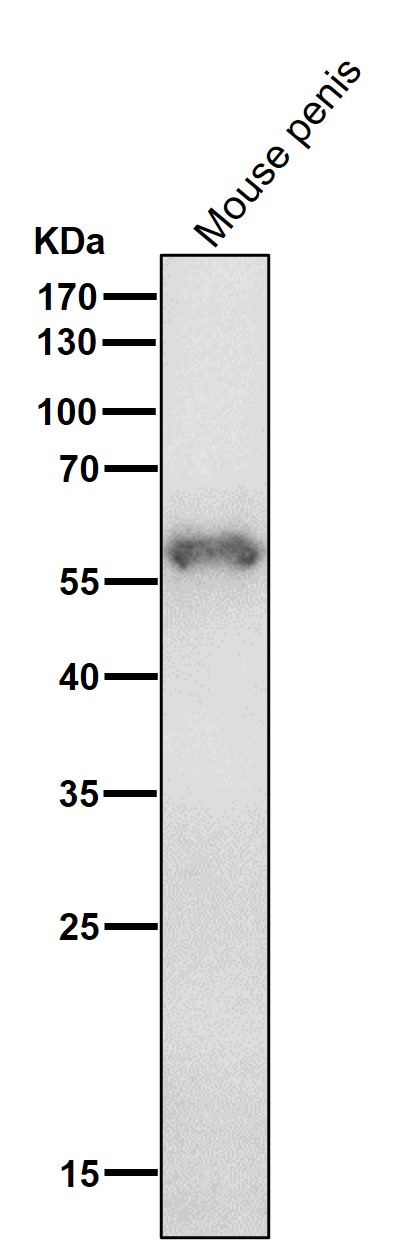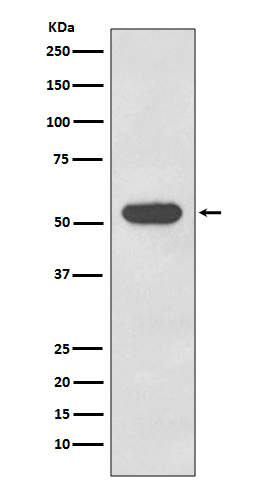

| WB | 咨询技术 | Human,Mouse,Rat |
| IF | 咨询技术 | Human,Mouse,Rat |
| IHC | 咨询技术 | Human,Mouse,Rat |
| ICC | 技术咨询 | Human,Mouse,Rat |
| FCM | 1/200 - 1/400 | Human,Mouse,Rat |
| Elisa | 1/10000 | Human,Mouse,Rat |
| Aliases | CK 4; CK-4; CYK4; Cytokeratin4; FLJ31692; K4; Keratin 4; Keratin; Keratin type II cytoskeletal 4; Keratin4; Krt4; type II cytoskeletal 4; Type-II keratin Kb4;;Cytokeratin 4 |
| WB Predicted band size | Calculated MW: 56 kDa ; Observed MW: 57 kDa |
| Host/Isotype | Rabbit IgG |
| Antibody Type | Primary antibody |
| Storage | Store at 4°C short term. Aliquot and store at -20°C long term. Avoid freeze/thaw cycles. |
| Species Reactivity | Human |
| Immunogen | A synthesized peptide derived from human Cytokeratin 4 |
| Formulation | Purified antibody in PBS with 0.05% sodium azide,0.05% BSA and 50% glycerol. |
+ +
以下是关于SMYD2抗体的3篇参考文献的简要概括:
1. **文献名称**: "SMYD2-Mediated p53 Methylation Promotes Its Ubiquitination and Impairs Cell Cycle Checkpoint Control"
**作者**: Huang et al.
**摘要**: 本研究揭示了SMYD2通过甲基化p53蛋白的赖氨酸残基(K370),促进其泛素化降解,从而削弱细胞周期检查点调控。实验中使用的SMYD2抗体被用于免疫沉淀和Western blot分析,验证了SMYD2与p53的直接相互作用及其在癌症中的促癌机制。
2. **文献名称**: "Development of a Monoclonal Antibody Specific for SMYD2 and Its Application in Detecting SMYD2 Expression in Human Cancers"
**作者**: Zhang et al.
**摘要**: 研究团队开发了一种高特异性的SMYD2单克隆抗体,并通过免疫组化(IHC)和免疫荧光(IF)验证其在多种癌症组织中的表达。该抗体被证明在乳腺癌和结直肠癌中具有高灵敏度和特异性,为SMYD2作为癌症生物标志物的研究提供了工具支持。
3. **文献名称**: "SMYD2 Inhibition by a Small Molecule Antagonist Impairs Cancer Cell Growth and Metastasis"
**作者**: Wang et al.
**摘要**: 本研究利用SMYD2抗体筛选并验证了一种小分子抑制剂(LY-13)对SMYD2甲基转移酶活性的抑制作用。实验表明,LY-13通过阻断SMYD2对HSP90的甲基化,抑制肿瘤细胞增殖和转移。SMYD2抗体在机制研究中用于检测靶蛋白甲基化水平的变化。
4. **文献名称**: "Epigenetic Regulation of SMYD2 in Cardiac Fibrosis"
**作者**: Chen et al.
**摘要**: 该研究探讨SMYD2在心脏纤维化中的作用,发现其通过甲基化组蛋白H3K4促进纤维化相关基因表达。SMYD2抗体在染色质免疫沉淀(ChIP)中用于定位SMYD2在基因组上的结合位点,揭示了其在疾病中的表观遗传调控机制。
以上文献均涉及SMYD2抗体的应用,涵盖癌症机制、抑制剂开发及疾病模型研究。
SMYD2 (SET and MYND domain-containing protein 2) is a lysine methyltransferase that catalyzes the methylation of both histone and non-histone proteins, playing a critical role in epigenetic regulation and cellular signaling. Structurally, it contains a characteristic SET domain split by a MYND domain, which facilitates substrate recognition and protein-protein interactions. SMYD2 methylates targets such as p53. RB, HSP90. and histone H3K4. influencing processes like cell cycle progression, apoptosis, and stress response pathways.
Dysregulation of SMYD2 is linked to multiple cancers, including hepatocellular carcinoma, gastric cancer, and esophageal squamous cell carcinoma, where its overexpression often correlates with poor prognosis. It promotes tumorigenesis by modulating oncogenic pathways and impairing tumor suppressor functions, making it a potential therapeutic target. SMYD2 inhibitors are under investigation for cancer treatment.
SMYD2-specific antibodies are essential tools for studying its expression, localization, and molecular interactions. They are widely used in techniques like Western blotting, immunohistochemistry, and chromatin immunoprecipitation (ChIP). Commercial antibodies are typically validated for specificity against SMYD2's unique epitopes, though cross-reactivity with other SMYD family members (e.g., SMYD3) requires careful experimental controls. These antibodies have advanced research into SMYD2's pathological roles and its validation as a biomarker in disease models. Major antibody suppliers include companies like Abcam, Cell Signaling Technology, and Santa Cruz Biotechnology.
×